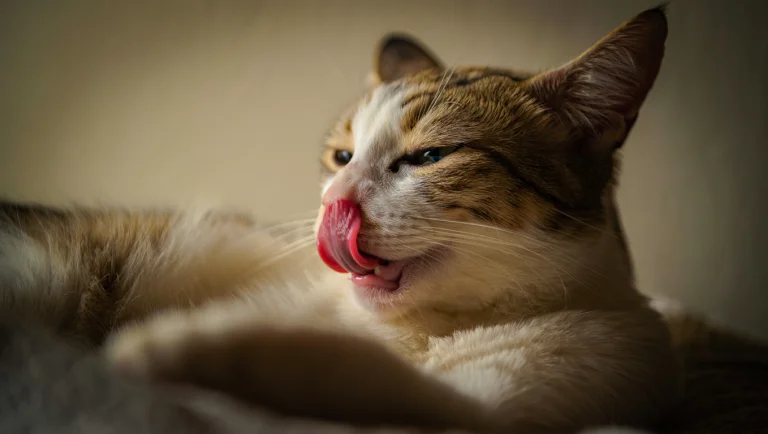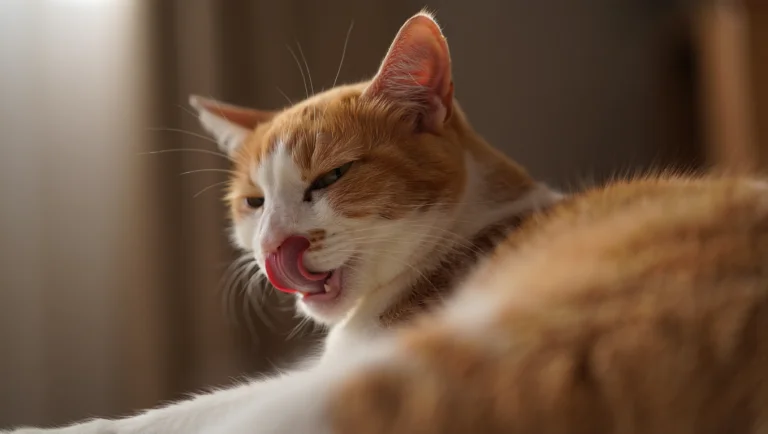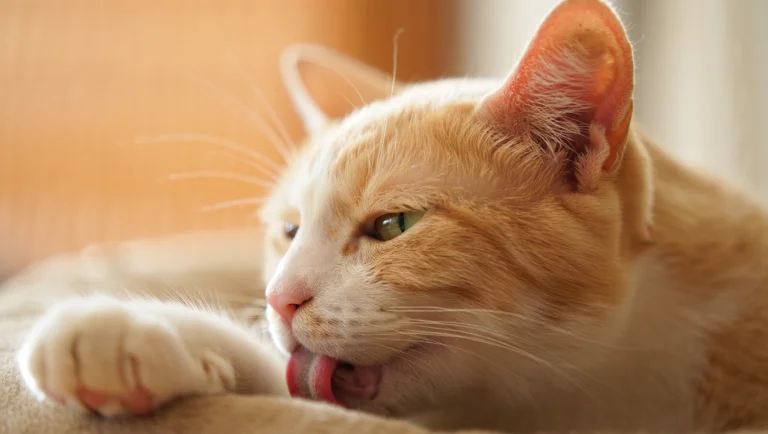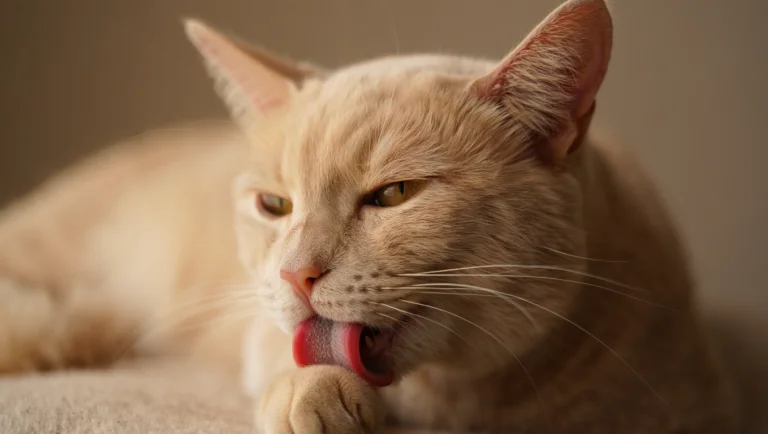Discover why do cats lick me with 9 scientifically-backed reasons for this common feline behavior. Learn what your cat’s licking really means for your bond.

Table of Contents
Have you ever wondered, “Why do cats lick me?” Those rough little tongues can sometimes take us by surprise – whether it’s a gentle lick on your hand while petting them or an unexpected grooming session when you’re trying to sleep. This curious feline behavior isn’t just random; it carries significant meaning in the complex world of cat communication and can tell us volumes about our relationship with our furry companions.
As cat lovers, understanding why our feline friends engage in this behavior helps us strengthen our bond and respond appropriately to their needs. In this comprehensive guide, we’ll explore the fascinating reasons behind cat licking, decode what your cat might be trying to tell you, and learn how this behavior impacts your unique relationship.

Understanding Cat Licking Behavior
Before diving into the specific reasons why cats lick their humans, it’s important to understand the physical and evolutionary aspects of this behavior.
The Unique Structure of a Cat’s Tongue
A cat’s tongue is a remarkable biological tool, distinctly different from our own. Covered in tiny backward-facing spines called papillae, these hook-like structures are made of keratin – the same material as their claws. This specialized design serves multiple purposes in a cat’s life:
- Grooming efficiency: The papillae act like a natural comb, removing loose fur, dirt, and parasites
- Food consumption: Helps cats rasp meat from bones and efficiently lap up water
- Temperature regulation: Distributes saliva across their fur to cool down through evaporation
According to a 2018 study published in the Proceedings of the National Academy of Sciences, these tiny spines are shaped like hollow scoops, making them incredibly efficient at cleaning and distributing saliva.
Licking as an Evolutionary Trait
In the wild, grooming serves critical survival functions for cats:
- Removing scents: Wild cats lick themselves to remove food odors that might attract predators
- Wound care: Cat saliva contains some antibacterial properties that can aid in healing minor injuries
- Social bonding: Mutual grooming (allogrooming) establishes and maintains social relationships within feline communities
Understanding these evolutionary roots helps explain why domestic cats continue these behaviors even when they’re no longer necessary for survival. When your cat transfers these instinctual behaviors to you, it represents a significant extension of their natural feline communication.

The 9 Real Reasons Why do Cats Lick Me
1. Showing Affection and Love
One of the most heartwarming reasons why cats lick you is simply to express love. For cats, grooming is intimately connected with affection.
What the experts say: According to certified animal behaviorist Dr. Elizabeth Stelow from UC Davis Veterinary Medicine, “When cats lick their owners, they’re transferring their scent and simultaneously expressing that they consider the person part of their social group.”
When your cat licks you, they’re essentially treating you as they would another beloved cat – a high compliment in the feline world. Mother cats groom their kittens not just for cleanliness but as an expression of care and nurturing. Your cat is extending this same nurturing behavior to you.
Signs it’s affection:
- The licking is gentle and rhythmic
- Your cat appears relaxed with half-closed eyes
- They might purr simultaneously
- The licking often occurs during quiet bonding moments
2. You Taste Interesting to Them
Let’s face it – humans can be rather salty! The natural oils and salts on our skin can taste interesting to cats, especially after we’ve been exercising or working outdoors.
Cats have about 470 taste buds (compared to our 9,000+), but their sense of taste is specialized to detect particular flavors that matter in their diet. They’re especially sensitive to:
- Amino acids (the building blocks of protein)
- Salts
- Acids
- Bitter compounds
After you’ve prepared food, exercised, or applied lotions, your skin might carry traces of flavors that intrigue your cat. Their curious nature leads them to investigate these new tastes.
Interesting fact: A 2019 study in the Journal of Comparative Physiology found that cats can’t taste sweetness at all due to mutations in their taste receptors – explaining why they’re generally uninterested in sugary treats that humans enjoy.
3. Social Bonding and Territory Marking
For cats, scent is an essential aspect of their social world. By licking you, your cat is:
- Mixing their scent with yours
- Creating a “group scent” that identifies you as part of their family
- Establishing a scent-based bond that other cats can detect
Territorial implications: When your cat licks you, they’re essentially “claiming” you as part of their territory. This behavior is particularly common in multi-cat households, where cats might compete for your attention and affection.
Dr. John Bradshaw, anthrozoologist and author of “Cat Sense,” explains: “When cats groom their owners, they’re depositing their scent and creating what we call a ‘group scent.’ This helps them recognize who belongs to their social group.”
4. They’re Grooming You – Just Like Another Cat
When your cat licks you, they may genuinely be trying to help you with your “grooming needs.” From their perspective, you’re an oversized, rather incompetent cat who needs assistance staying clean.
This allogrooming (grooming another individual) behavior is natural among cats who are socially bonded. In feral cat colonies, cats frequently groom one another, focusing on areas that are difficult to reach like the head and neck.
How to recognize grooming behavior:
- Your cat focuses on a specific area repeatedly
- The grooming may be thorough and meticulous
- They might try to “fix” your hair or clothing
- This behavior often occurs after you’ve returned home with “foreign” scents
A study published in the Journal of Veterinary Behavior found that cats who engage in allogrooming with humans typically display strong attachment behaviors, suggesting this is a sign of a particularly close bond.
5. Stress Relief and Self-Soothing
Sometimes when cats lick their owners, they’re actually self-soothing. Licking releases endorphins in cats, creating a calming effect similar to how humans might find comfort in repetitive behaviors when anxious.
When licking indicates stress:
- The licking seems compulsive or excessive
- Your cat appears tense rather than relaxed
- The behavior increases during changes in the household
- It’s accompanied by other anxiety indicators like tail flicking or dilated pupils
Certified animal behaviorist Jackson Galaxy notes that excessive licking can be a displacement behavior – something cats do when they’re experiencing conflicting emotions or are unsure how to respond to a situation.
If your cat’s licking seems stress-related, consider:
- Identifying potential stressors in their environment
- Creating more predictable routines
- Providing safe spaces where they can retreat
- Consulting with your veterinarian if the behavior becomes problematic
6. Early Weaning and Comfort-Seeking
Cats who were weaned too early sometimes develop oral fixations that persist into adulthood. This can manifest as:
- Excessive licking of owners
- Sucking on fabrics, especially wool
- Kneading accompanied by licking
A 2017 study in the Journal of Feline Medicine and Surgery found that cats separated from their mothers before 8 weeks of age were significantly more likely to display these oral comfort behaviors throughout their lives.
For these cats, licking provides a sense of security and comfort similar to what they would have experienced nursing as kittens. The behavior is usually harmless, though excessive fabric sucking should be monitored to prevent ingestion of harmful materials.
7. Attention-Seeking Behavior
Some clever cats learn that licking gets a reaction from their humans! Whether you find it endearing or annoying, your response reinforces this behavior.
Signs it’s attention-seeking:
- The licking starts when you’re busy with something else
- Your cat makes eye contact while licking you
- They stop when you give them attention
- The behavior intensifies when they want something (like food)
Cats are masterful observers of human behavior and quickly learn what actions prompt their humans to interact with them. If you consistently respond to licking by petting, talking to, or feeding your cat, they’ll incorporate this into their repertoire of attention-getting tactics.
8. Medical Issues or Nutritional Deficiencies
While less common, sometimes excessive licking has underlying medical causes that should be ruled out, especially if the behavior appears suddenly or becomes compulsive.
Potential medical causes include:
- Pica (eating non-food items) related to nutritional deficiencies
- Gastrointestinal issues causing nausea
- Cognitive dysfunction in senior cats
- Pain or discomfort elsewhere in the body
- Hyperthyroidism
A 2021 veterinary survey found that approximately 3-5% of cats with new excessive licking behaviors had underlying medical issues requiring treatment. If your cat’s licking seems unusual or obsessive, consult your veterinarian.
9. Pre-Play or Stimulation
Some cats lick right before playful behavior – almost like they’re “taste-testing” before a pounce! This playful licking is often:
- Quick and followed by other play behaviors
- Accompanied by dilated pupils and an alert posture
- More common in energetic, young cats
- Sometimes followed by gentle nibbling
This type of licking is part of their predatory sequence – in the wild, cats might lick prey before delivering a bite. When directed at humans, it’s a highly modified, gentler version of this instinct.
Understanding Your Cat’s Unique Communication Style
Each cat has their personal “dialect” of communication. Some are effusive lickers, while others rarely engage in the behavior. Understanding your specific cat’s patterns helps you respond appropriately.
Reading Your Cat’s Body Language While Licking
Context matters enormously when interpreting why your cat is licking you. Pay attention to:
Eyes:
- Relaxed, half-closed eyes suggest affectionate grooming
- Wide, dilated pupils might indicate excitement or stress
- Slow blinking paired with licking signals deep trust
Body posture:
- Relaxed, loose posture indicates comfort
- Tense muscles or flattened ears suggest anxiety
- Tail position (upright and relaxed vs. twitching or low)
Timing and circumstances:
- Licking during quiet moments likely indicates bonding
- Licking after you’ve been away may be scent-related
- Morning licking might relate to hunger or excitement
A 2020 study in the journal Applied Animal Behaviour Science found that cats display consistent individual differences in their communication styles, with some preferring vocal communication while others rely more heavily on tactile interactions like licking.
Should You Encourage or Discourage Cat Licking?
Whether cat licking is something to encourage depends on both your preferences and the specific context of the behavior.
When Licking Is Positive
- Bonding opportunities: Moderate licking represents trust and affection
- Communication channels: It’s one way your cat expresses their needs
- Health insights: Changes in licking behavior can alert you to potential health issues
When to Redirect Licking
There are circumstances where you might want to gently discourage licking:
- Excessive or compulsive licking that seems stress-related
- Sensitive skin or allergies making cat saliva irritating
- Medical concerns like immunocompromised family members
- When licking prevents sleep or interrupts activities
How to Redirect Unwanted Licking
If you need to discourage licking, use positive techniques:
- Provide an alternative focus like a toy or treat
- Gently move your hand away without punishment
- Redirect to appropriate petting sessions
- Never scold or punish, which can damage trust
Dr. Mikel Delgado, certified cat behavior consultant, advises: “Rather than punishing licking behavior, which can confuse and stress your cat, focus on providing appropriate alternatives that meet the same emotional needs.”
Building a Stronger Bond Through Understanding
Understanding why cats lick you provides valuable insights into your cat’s emotional world and needs. This knowledge allows you to:
- Respond appropriately to what your cat is trying to communicate
- Strengthen trust by respecting their natural behaviors
- Identify potential problems early through changes in licking patterns
- Create more meaningful interactions based on mutual understanding
The human-cat bond is a unique cross-species relationship that requires effort and understanding from both parties. When we take time to decode behaviors like licking, we show respect for our cats’ natural communication methods.
How Different Cats Express Affection
Not all cats are lickers! Cats have diverse ways of showing affection that reflect their individual personalities and past experiences:
- The Chatterer: Communicates primarily through vocalizations
- The Headbutter: Prefers physical contact through headbutts and rubs
- The Gifter: Brings “presents” as tokens of affection
- The Shadow: Shows love by following you everywhere
- The Licker: Uses grooming as their primary affection language
A 2018 survey of over 10,000 cat owners found that approximately 65% of cats lick their owners at least occasionally, while others express affection through alternative means. Understanding your cat’s unique “love language” helps you appreciate their individual way of bonding.
Cultural Significance of Cat Licking
Throughout history, cat behaviors have carried different meanings across cultures:
- In ancient Egypt, being licked by a cat was considered a blessing
- Japanese folklore viewed cat licking as a healing behavior
- Several Native American traditions saw cat licking as a sign of spiritual protection
- European medieval superstitions sometimes viewed excessive cat licking as an omen
While we now understand the biological and behavioral underpinnings of licking, these cultural interpretations remind us how long humans have been fascinated by and attached meaning to this distinctive feline behavior.
Expert Tips for Responding to Cat Licking
Veterinary behaviorists recommend these approaches when your cat licks you:
- Stay still briefly to acknowledge the affection if appropriate
- Observe the context to better understand the motivation
- Respond with gentle petting if it seems affection-related
- Check for stress triggers if the licking seems anxious
- Monitor for changes in licking patterns that might indicate health issues
- Create alternatives if the licking becomes problematic
Dr. Karen Overall, veterinary behaviorist and researcher, suggests: “The most important thing is consistency in your response. Cats thrive on predictability, so deciding how you’ll respond to licking and maintaining that approach helps your cat understand boundaries.”
Frequently Asked Questions About Cat Licking
Why does my cat lick me and then bite me?
This behavior, often called “love biting” or “petting-induced aggression,” typically occurs when your cat becomes overstimulated during affectionate interactions. The licking starts as affection, but continued petting can create conflicting feelings of pleasure and irritation. The bite is your cat’s way of communicating they’ve reached their stimulation threshold.
To prevent this pattern:
- Watch for warning signs like tail twitching or skin rippling
- Keep petting sessions shorter
- Allow your cat to initiate and end interactions
- Learn your individual cat’s tolerance levels
Is it safe for cats to lick people?
For most healthy individuals, cat licking is safe, though there are some considerations:
- Cat saliva contains bacteria that rarely affect healthy humans
- People with compromised immune systems should exercise greater caution
- Cat saliva may trigger allergic reactions in sensitive individuals
- Keep cats away from open wounds, eyes, or mucous membranes
A study published in the Journal of Small Animal Practice found that while cat saliva does contain potentially pathogenic bacteria, transmission to humans through licking is extremely rare in healthy individuals.
Why does my cat lick me more than other family members?
Cats often show preferences in their interactions based on:
- Who feeds them most consistently
- Individual scent preferences
- Similarity to their early socialization experiences
- Behavioral patterns and energy levels that match their comfort zone
- How responsive different people are to their communication attempts
Research from the University of Lincoln (UK) suggests cats form different types of attachments to different family members, sometimes treating one person more like a maternal figure and others as playmates or companions.
Is excessive licking ever a cause for concern?
Yes, sudden changes in licking behavior or truly excessive licking might indicate:
- Anxiety or stress requiring environmental modifications
- Pain or discomfort that needs veterinary attention
- Compulsive disorders that develop in some cats
- Cognitive changes in senior cats
As a general guideline, if licking interferes with normal activities or seems distressing to your cat, consult with your veterinarian.
Do cats lick certain people more than others?
Cats may display preferences for licking specific people based on:
- Skin chemistry and taste
- Grooming needs they perceive (drier skin, longer hair)
- Level of trust and bonding
- Past positive reinforcement of the behavior
Research from the Veterinary University of Vienna suggests cats can distinguish between familiar and unfamiliar humans primarily through scent, which may influence who they choose to groom.
Can I train my cat to lick me less?
While you can’t completely reprogram natural behaviors, you can modify them through:
- Consistent, gentle redirection
- Providing appropriate alternatives
- Addressing underlying causes (stress, boredom)
- Positive reinforcement of desired behaviors
Remember that licking is a compliment in cat language, so modification should be done respectfully and with an understanding of your cat’s intentions.
Conclusion:
When your cat licks you, they’re communicating in one of the most direct ways they know. This behavior offers a precious window into their emotional world and how they perceive their relationship with you. By understanding the various reasons behind this distinctive behavior, you can:
- Respond more appropriately to your cat’s needs
- Recognize potential health or behavioral concerns early
- Appreciate the compliment your cat is paying you
- Strengthen the unique cross-species bond you share
The next time you feel that sandpapery tongue, take a moment to consider which of the nine reasons might explain your cat’s behavior in that specific context. Each lick is part of the complex, fascinating language of cats – one they’ve invited you to learn.
Have a similar experience with your pet? Share it in the comments below!

